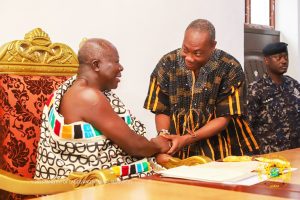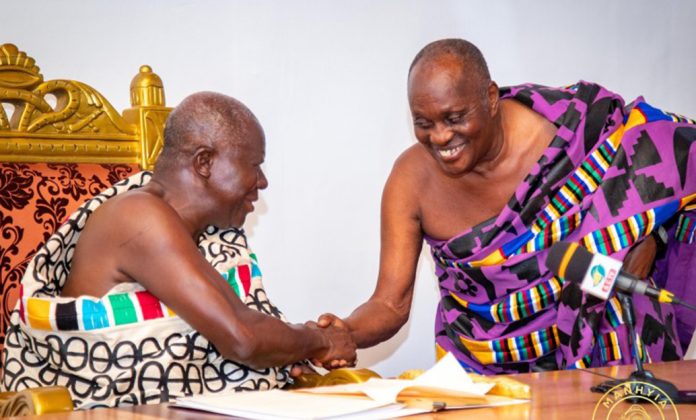The Ashanti Regional House of Chiefs has appointed Nana OtuoSiriboe II, Juabenhene, as its representative at the National House of Chiefs.The appointment was confirmed at the first meeting of the House on July 18, 2025 presided over by OtumfuoOsei Tutu II, Asantehene.
Nana OtuoSiriboe replaces the late Mamponghene, DaasebreOseiBonsu II.
The meeting also witnessed the induction of three new traditional leaders into the Ashanti Regional House of Chiefs.

They are Nana AkosaYiadom, Denyase chief, Nana OwusuAmpe, Obogu chief and Nana Kofi Asante, Sabronum chief, who were welcomed with traditional rites and ceremonies, signifying their integration into the esteemed body.
The House also engaged a delegation from the Ministry of Lands and Natural Resources in a stakeholder consultation on the 2014 Mining Policy and proposed amendments to the Minerals and Mining Act, 2006 (Act 703) by the Minerals Commission.
The consultation highlights the importance of collaborative governance and the need for traditional leaders to be actively involved in policy-making processes that affect their communities.
Addressing the House, the Deputy Minister for Lands and Natural Resources, Yusif Sulemana, emphasised the significance of the Ashanti Region as the epicentre of Ghana’s mineral wealth, particularly gold.
He indicated that the government would make it mandatory for traditional authorities to endorse mining activities in their areas, to ensure that local needs and values are prioritised.
According to him, a new initiative will enable local cooperatives under the guidance of traditional authorities to own and manage mining ventures in a structured and sustainable manner.
The Minerals Commission has proposed amendments to the Minerals and Mining Act, 2006 (Act 703), aimed at addressing weaknesses in the current legal framework, improving royalty collection and regulating foreign participation in small-scale mining, and strengthening environmental and social safeguards.
The Asantehene, Otumfuo Osei Tutu II, emphasised the need for meaningful local participation in mining operations, value addition and infrastructure development in mining communities.
He also called for stronger regulatory frameworks to prevent multinational companies from repatriating profits without making significant investments in Ghana.
He disclosed that the reforms aim to prioritise Ghanaian Interests and Ensure mining activities benefit Ghanaians, rather than solely multinational corporations.
His Royal Majesty expressed the view that the reforms would safeguard lands and water bodies from environmental degradation and Local Economic Empowerment to Support local miners in establishing lawful and profitable enterprises.









